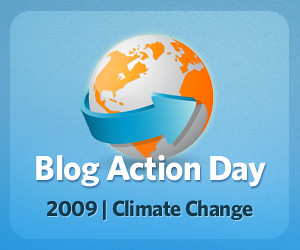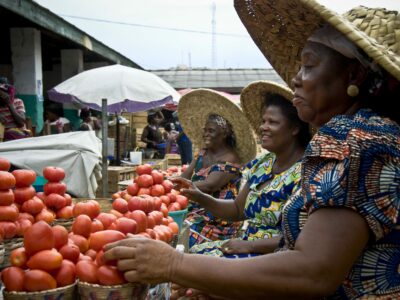Blog Action Day 2009 was an online event organized by Change.org. It was a virtual gathering of voices discussing climate change. Bloggers from a sampling of countries in Sub Saharan Africa were among those who posted their thoughts, and in this post, we get to listen to their voices.
Kenya
The blogger at Theatre of Inconveniences reminds readers to also think about wildlife and the species threatened with extinction due to climate change. The blogger also looks at the extreme weather situation in Kenya, with a drought that has lasted many months and the expected heavy rains.
In Kenya recently, prolonged drought – and we can not rule out the effects of climate change as the cause – first killed livestock, then pushed the livestock into wildlife habitats, then killed the wildlife. Now Kenya is – ironically – waiting for El Nino rains to settle in so that it can save people, their livestock and wildlife. But the El Nino could be made more severe by the effects of climate change. So more people, livestock and wildlife will die. Iregi Mwenja, a Kenyan bushmeat researcher posted pictures of the onset of the El Nino rains in Voi today. One of the casualties of the big water was a masai goat that died in the floods.
The blog Sukuma Kenya took UNEP (United Nations Environment Program) to task on its use of gas guzzling SUV's that release more CO2 into the atmosphere than smaller cars. The blogger wonders whether for one day, the UNEP officials would heed their own advice to cut CO2 emissions.
The blogger on Katch up shares their experience climbing Mt.Kenya, one of the few snow capped mountains in Africa. The blogger mentions changes in the ice coverage as pointed out by the tour guide, and also notices other changes in the environment. A brief story from the blogger's mother illustrates just how fast the environment has changed.
I come from a cold place and my mother tells me how fast certain types of crops used to grow, rain was abundant, seasons were more than one and it was colder. Not anymore. Those days were definitely better and we have been losing.
South Africa
Rory of Carbon Smart writes about community empowerment and climate change. The effects of climate change on the majority of Africans will be severe, and any strategies at dealing with climate change should provide support to the communities.
In Africa particularly, stresses are already being felt – climate change is not something that relates only to the future. The most vulnerable communities are those who struggle the most, as they are living on the edge – quite literally on the periphery of economic activity, whether they are subsistence farmers or urban slum dwellers. In this position, they don't have ‘wiggle room’, or the flexibility to adapt their lifestyles to the changes they are experiencing. As a result, strategies for climate change adaptation must ensure that communities do have the means and understanding and support structures to enable them to keep ahead of environmental changes. A key point to be made is that the answer lies not primarily in technology or aid, but crucially in building relationships – institutionally, socially and financially.
Poetry and Poesie shares a poem on global warming
The bergs look limp
to me nowaseasons,
I shouldn't read
National Geographic,
that once was a tree
now covered in blinding shots
of glaciers gliding all the more
readily
sweating in the gloaming -
a new word I coined
for global warming.I don't need to read
journalistic twilight musings,
I can see when a bear
is panting to death,
I can see the whales flail
in the a-krillic blue sea,
I know the götterdämmerung
is going to be a hot event
Inuitively.
Uganda
Climate Change. Its not just Koalas.
Rebecca writes on Jack Fruity about her experience in the Global Change exchange program, that will be documenting the effects of climate change and partnering with established bloggers in the Global Voices community.
It can be easy to forget that climate change is about more than trees and cuddly animals and fish swimming around in some distant ocean — all of which I care about, don't get me wrong (especially the cuddly animals). But climate change also has real, physical effects on humans: it's altering weather patterns in unpredictable ways, causing crops to fail for lack of rain in some places while floods wash away entire fields in others.
Ghana
Jemila Abdulai writes on Circumspecte blog, she looks at the climate change deniers, and those who believe it to be a hoax, debunks their arguments and sets forth the lessons for Ghana and Africa. The lessons include Information, Education and Accountability.
Ghana and other African countries are relatively better-off (I think) when it comes to pollution. How can we reduce what pollution we have, and how can we prepare for the future?
We should be doing our research and looking at all these models (failed or otherwise) to inform our own policy decisions. If we don't keep ourselves informed, we will have a situation similar to our current economic systems; we'll have policies, laws and structures that do not work for us. Already, many multi-lateral companies get away with polluting our countries without so much as a slap on the hand for this. That's where our concern should be: strengthening our legal structures to protect our environment and consequently, our population.
A great roundup of Ghanaian blog posts on Blog Action day is done by Mac-Jordan of Accra Conscious.
We end with the voice of ‘cuppatea’ on the blog A colourful life of a Gay Kenyan:
So in summary, stop polluting, plant trees and be nature friendly! It will save mother nature and planet earth and you'll make nature fans like me globally happy! The future generation depends on nature. Positive action today, Better tomorrow for future generations.
Note: For previous Global Voices posts, kindly see these links.
– Reading the world on Blog Action Day
– Israel: Blog Action Day for the Environment
- Rising Voices summarizes blog posts from its grantees.








3 comments
The last, best chance for the children is “now-here”. Let’s hope those with power to create the colossal ecological mess that is now presented to humanity will agree to help clean the global mess up before it is too late for human interventions to make a difference.
Human-induced challenges can certainly be acknowledged, addressed and overcome by human-driven action.